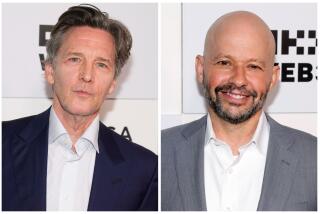Teamster Chief Denounces Predecessors in Testimony
- Share via
WASHINGTON — Teamsters President William J. McCarthy, denouncing his two predecessors as “a schemer” and “a liar,” Tuesday denied any personal links to organized crime and contended that allegations of widespread corruption in his union are “vastly” exaggerated.
Nevertheless, in testimony before the Senate Governmental Affairs permanent subcommittee on investigations, McCarthy pledged to support amendments to the Teamsters’ constitution that would provide for direct, secret balloting by the rank and file--a change in the charter that was stipulated in the recent settlement of a federal racketeering suit against the union.
The white-haired McCarthy’s testimony marked a historic appearance before the subcommittee that has led legislative efforts against organized crime and labor corruption since the 1950s. And, unlike Teamster leaders before him, McCarthy responded freely to senators’ questions.
Appears Reluctant
But he appeared reluctant to acknowledge serious problems involving ties between organized crime and his union. There will always “be somebody with their hand in the cookie jar,” he said, suggesting that any such problems have been confined to the Central States region of the Teamsters empire--from which his two immediate predecessors came.
Indeed, McCarthy declared that he is unfamiliar with a 1986 report by the President’s Commission on Organized Crime that ranked the International Brotherhood of Teamsters as the union “most controlled” by the underworld syndicate.
“No, sir, I’m not familiar with the report at all,” McCarthy, an international vice president of the union when the report was issued, told Sen. Sam Nunn (D-Ga.), the subcommittee chairman.
“Wouldn’t it be to your advantage to read that report . . . ?” Nunn pressed.
“I will, eventually. But I’m up to my neck,” said McCarthy, who took command of the 1.6-million-member union last July.
Underscoring his insistence that organized crime is unknown territory for him, the union leader repeatedly mispronounced the name of La Cosa Nostra, or Mafia, calling it “Costa Nastra.” And he referred to Raymond Patriarca Sr., the late reputed Mafia leader in Rhode Island, as “Patriarki.”
McCarthy had harsh words for his immediate predecessors:
--The late Jackie Presser, who served as an FBI informant on the Mafia’s influence over the Teamsters and whose death from cancer opened the way for McCarthy to become president.
--Roy L. Williams, the former union leader who was convicted of a bribery conspiracy and then gave damaging testimony on mob infiltration of the Teamsters.
“One was a schemer and one was a liar, and both were mixed up with Costa Nastra,” McCarthy declared.
Presser “wasn’t cooperating” with the FBI over the years that he served as an informant, McCarthy said. “He was scheming for himself.”
Denouncing Presser as “a crooked stool pigeon,” McCarthy told Sen. William V. Roth Jr. (R-Del.), ranking minority member of the subcommittee, that the late union chieftain “was looking to help himself anyway he could.”
McCarthy seemed to grow angriest when Roth questioned him about an entry in Presser’s FBI file that quoted him as saying that McCarthy told him he had to check first with Patriarca in 1984 about becoming the Teamsters’ secretary-treasurer.
“That’s a lie,” McCarthy declared. “He definitely flipped it around.” McCarthy said it was Presser who said that McCarthy had to “get clearance” for the job with Patriarca, then a top Mafia figure in New England.
“I said, ‘no way. I don’t know him. I don’t talk to him,’ ” McCarthy told the subcommittee.
Points to Intent
McCarthy cited his removal last year of former Teamsters international vice president Maurice Schurr a month after becoming president as evidence of his intent to clean up corruption inside the union.
But Benito Romano, U.S. attorney in Manhattan whose office brought the sweeping racketeering suit against the Teamsters, pointed out to the subcommittee that Schurr had been convicted of a federal criminal violation and served a prison term in 1984--a time when McCarthy was on the Teamsters’ general executive board.
Roth asked McCarthy if he did not have responsibility as an international vice president to help ensure that the union was not corrupted by organized crime.
“No, I felt that was his (Presser’s) responsibility as general president,” McCarthy said.
Under questioning by Nunn, Romano agreed that McCarthy and other Teamster leaders who joined in the settlement of the racketeering suit retained the First Amendment right to oppose changes in the union constitution mandated by the agreement.


